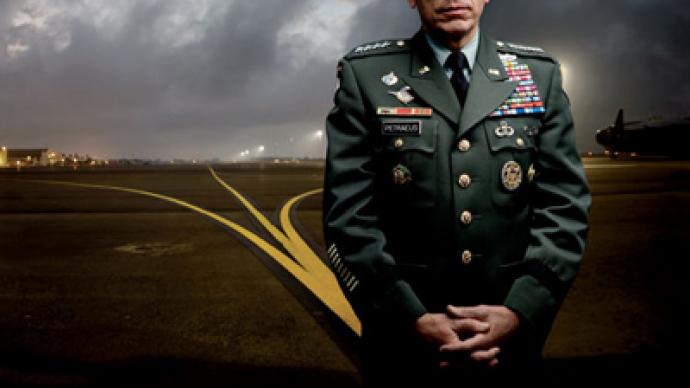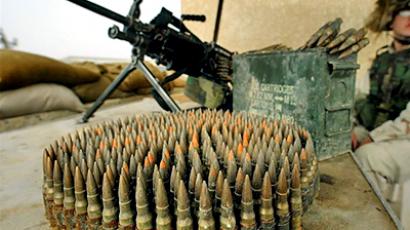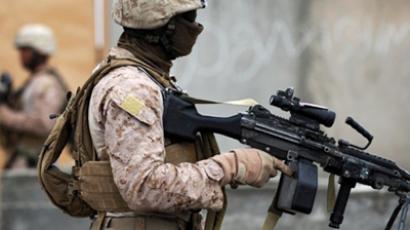Petraeus spins Afghan war as reports paint grim picture

It was meant to be an honest and open conversation about the state of the war in Afghanistan. And who better to report to the US Senate than General David Petraeus himself.
In his introductory remarks, Petraeus said, “The past eight months have seen important but hard-fought progress in Afghanistan.” The hearing was a report card of sorts, for those serving on the Senate Armed Services Committee, like Sen. Joseph Lieberman of Connecticut.“Nobody’s under any illusion here that this is turning around,” Lieberman said.But the question remains, in which direction is it turning? On one hand, many who were present at the hearing feel good about the war effort in Afghanistan. “We’re there for a reason,” said Sen. Lieberman. “We’re making progress.”“We have made a great deal of progress in Afghanistan since the last hearing of this committee on the subject just over a half a year ago,” said Sen. John McCain (R-AZ). Petraeus reminded lawmakers that nothing was set in stone.“While the security progress achieved over the past year, it is also fragile and reversible,” he said using a line that has been used dozens of times over the last few days. However, in the same hearing room just last week, a bit of a different tune was sung.“We have enjoyed tactical defeats and operational successes against the Taliban,” said Lt. General Ronald Burgess, the Director of the Defense Intelligence Agency.“However, the Taliban does remain resilient and will be able to threaten US and international goals in Afghanistan through 2011.” At the March 8, 2011 Senate Armed Services Committee hearing, National Intelligence Director James Clapper gave a grim intelligence assessment about the future."I think the issue, the concern that the intelligence community has, is after that, and the ability of the Afghan government to pick up their responsibility for governance,” Clapper said. Over the last few weeks there has been additional hardship in the mission, and an increase in anger, after nine afghan children were killed in Afghanistan in a NATO led attack. Last week Secretary Gates traveled to Afghanistan and met with President Hamid Karzai.“I would like to begin by joining General Petraeus in offering my personal apology for the accidental killing of nine Afghan boys by coalition forces,” Sec. Gates said.President Karzai said his people were become increasingly frustrated by the violence.“They want it stopped. They want it not reduced. They want it stopped.”A few days later while visiting families in the Eastern Kunar Province, President Karzai said he actually wanted foreign troops out of Afghanistan and said they should instead take their fight across the border in Pakistan.Not only are they losing the US supported president of Afghanistan, now – there is new evidence that the war is losing support from the public as well. This Washington Post/ABC news poll just released shows 64 percent of Americans do not think the war has been worth fighting. A much larger number, 73 percent, think the US government should withdraw troops this summer as originally planned.Michael Prysner, military a veteran and member of the anti-war A.N.S.W.E.R coalition agreed.“The resistance in Afghanistan is a popular uprising of Afghans from all walks of life, from all backgrounds, in every corner of Afghanistan who rightfully see the occupation of their country as an empire trying to gain a foothold in the region that’s of strategic importance for resources and dominating the region,” he said. Recently, a suicide bomber posing as an army volunteer blew himself up outside a military recruiting center in Northern Afghanistan. 35 people, including many potential recruits were killed.Jake Diliberto, an RT Blogger and the founder of Veterans for Rethinking Afghanistan argued the only reason the US remains at war in Afghanistan is because President Obama is unable to control the Pentagon. “President Obama, with very little if no foreign policy credentials, has almost no control over the Pentagon. As a result the Pentagon gets to dictate the political policy and they also get to dictate the operational policy. That’s why we are still there,” he said.Diliberto argued that all three branches of the US government, the courts, legislature and executive office are controlled by the Pentagon. They have been manipulated by the military.The US population has been hoodwinked by the Pentagon, he argued. The American people care about the US troops, but the media and military misled everyone about the true cost and consequences of the war. The military has a well oiled machine in pace both domestically abroad to control the grand scheme of things. Obama does not.“In terms of foreign policy Obama, I think, is incompetent.” Diliberto said. “I don’t think he has the skills to control the Pentagon, to set the political objectives and to adjust us forward because he has been strong armed by the Pentagon.” As the military remains in control over the next few years military strategy will continue to win out, placing troops in Afghanistan permanently to address concerns over oil and other resource security, argued Diliberto.














